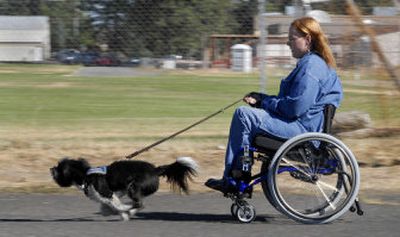Service animals to the rescue

Most dog owners love their pets and even consider them members of the family. Shelly Mitchell of Medical Lake depends on her dog for her life.
Mitchell, 33, who uses a wheelchair after being badly burned in a fire four years ago, relies on Oreo, her Shih Tzu-mix, to pull her wheelchair, open doors and help her with other daily tasks.
“I just can’t imagine my life without her,” Mitchell says. “We have such a spiritual connection with each other. I know what she’s thinking … It’s just amazing.”
Visually impaired individuals have long relied on dogs to guide them. But people with a wide range of conditions are calling upon service animals for all sorts of help.
Trained dogs can keep someone with poor balance from falling down. They can alert the hearing-impaired to important sounds. They can pick things up, carry things, open doors and turn on lights. In some cases, they can even alert their owners of an oncoming seizure, heart problem or change in blood sugar.
Nan Kelly of Spokane has diabetes, which causes nerve problems in her extremities. She falls sometimes and her hands go numb. Plus, she doesn’t see very well at night.
So, Kelly’s dog, Ali, helps pull her shoes off, picks up coins for her and helps her navigate in the dark.
Kelly is an independent living adviser with CORD, a Spokane non-profit organization that helps disabled people in a variety of areas, including with service animals.
Many different breeds of dog can be successfully trained to be a service animal, Kelly says.
“My dog came from the pound,” she says. “She’s a mini Aussie shepherd … My dog looks like a little wind-up Disney toy.”
Some people get service animals from an agency that trains them. Others pick a dog and train it themselves or with the help of a trainer.
Pat Moberly of Deer Park has been training service dogs for the last seven years. She estimates that one out of four dogs who start training will become a successful service animal.
“The bottom line is the dog has to want the job,” Moberly says. “There are many dogs who don’t want it.”
When looking for a dog to train, you want to find one that isn’t aggressive, has little desire to chase moving objects, and doesn’t bark much, she says. Most dogs can’t go into service until they are 2-years-old. Younger dogs lack maturity, she says.
You’ll also want to find a dog that’s the right size for the tasks you need performed, and a dog that doesn’t look vicious, she says.
“You want a dog who looks friendly to the general public,” Moberly says, adding that she always considers, “How is my 88-year-old mother going to feel about meeting this dog at the meat counter at Safeway?”
You should also look for a dog that doesn’t mind getting poked at by kids or having its tail stepped on or rolled over by a wheelchair on occasion.
“They have to put up with a lot,” she says.
Spokane mom Ellie Thompson is working hard to raise money to pay for a service animal for her 4-year-old son, Tyson.
The little boy has cerebral palsy and epilepsy, so the Thompsons are working with the Ohio-based nonprofit group 4 Paws for Ability to get a dog.
“It’s going to be so much help for us,” Thompson says.
They hope the dog will be able to help keep Tyson safe when he has a seizure, help the boy get up when he stumbles and also help him with balance. The family hopes to raise the necessary $9,800 by the end of October and receive the dog in February or March.
People with service animals say they face ongoing struggles over access to places that normally wouldn’t allow dogs. Federal law requires service animals to be allowed in all places that people are, as long as the animal is not behaving in a threatening manner, says Susan Duncan, a registered nurse and Bellevue, Wash.-based consultant for health-care and disability civil rights issues.
“I thought I’d be out of work by now,” says Duncan, who has practiced in this area for nearly 15 years. “There is so much misinformation and so much misunderstanding about the regulations.”
Before considering getting a dog, it’s important to talk with a health-care provider to see if an animal would help, Duncan says.
“It’s critical that people are evaluated medically to determine whether or not this is a good idea for them,” says Duncan, who has multiple sclerosis and uses a service dog herself.
As for Mitchell, she has no doubt that Oreo has helped her tremendously.
“We’ve had a wonderful relationship,” she says.
The dog has spared her from bladder infections because she tells Mitchell when her catheter bag is full, she says. And she recently alerted another person when Mitchell appeared ill.
“They thought I’d had a stroke,” says Mitchell, who says she didn’t have a stroke, but no one is sure why one side of her face drooped.
“People think it’s just a dog,” she says. “(But) they do so much for all of us, it’s not even funny.”